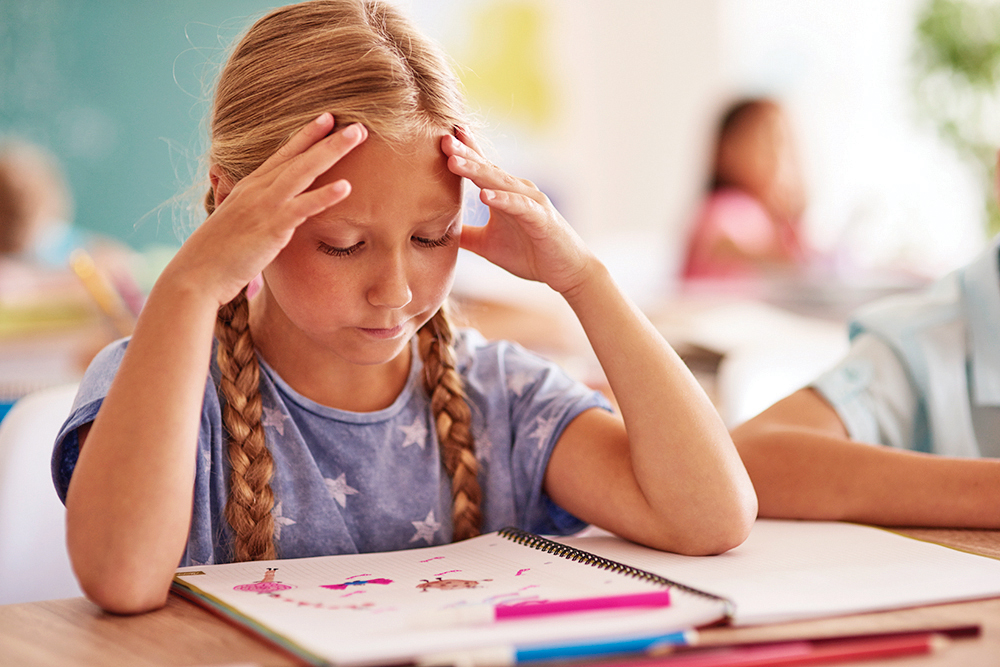Part I

Most people can probably remember having some level of school anxiety in their own childhoods. Perhaps it was being unprepared for a test, or a disagreement with friends that left you feeling anxious about seeing them in the halls, or even not wearing the latest “in” style. Many people have had knots in their stomach at the thought of going to school for a variety of reasons. Kids today experience the exact same thing, but at a much higher level than ever before.
Kids today have to deal with the impact of social media creeping into their real-life everyday social interactions. They’re facing ever-increasing academic expectations, and there’s also the issue of bullying. We’re also still feeling the aftereffects of COVID-19, which is manifested by a loss of social skills. It’s no wonder that the prevalence of anxiety among children ages 6 to 17 has increased over the past few years. According to the Centers for Disease Control (CDC) many of those diagnosed with school anxiety issues evolved into anxiety-based school refusal—one potential result of unaddressed school anxiety. School anxiety isn’t at all uncommon, but parents of kids with school anxiety can help to address it.
There are different types of anxiety that children may experience, many of which may translate into school anxiety. For younger children there is separation anxiety: a fear of being separated from home or one’s closest attachment figures. Social anxiety accompanies social interactions and settings, which include those that may take place at school. Of course there is generalized anxiety disorder (GAD), which can impact and encompass many facets of life, including school. Obsessive-compulsive disorder (OCD) is characterized by a need for extreme order, rituals and perfectionism, all of which can be more difficult to maintain in school. OCD may contribute to social anxiety for a student who is afraid of being made fun of as a result of their OCD habits. Finally, there is the issue of specific phobias. A specific phobia can relate to just about anything, from bugs and heights, to certain foods as well as school.
School anxiety can look different depending on the child’s age. For preschoolers, it may have more to do with separation anxiety and a fear of being away from mom, dad or other caregivers. This may result in tantrums at school drop-off and trouble relaxing throughout the day. By elementary school, school anxiety could be related to any of the above types of anxiety. A student this age may not yet have developed age-appropriate social skills and may have anxiety about school as a result, or they may spend excessive time worrying about academic expectations—to the extent of not wanting to go.
Middle schoolers are beginning to develop a social hierarchy that can result in an increase in bullying and various friendship turmoil, all of which can contribute to school anxiety. By high school, students may be juggling problems in their home lives and within their friendships and relationships. In addition, the transition to high school, making new friends, higher expectations and increased workload may also generate stress and anxiety. At all these ages, school anxiety may result in school avoidance and refusal.
School anxiety can manifest in a lot of ways. Parents and teachers may notice their students are struggling with paying attention, having a hard time sitting still, exhibiting a heightened level of clinging, becoming ill (or faking feeling ill) more frequently, throwing tantrums or displaying other behavioral problems, avoiding eye contact in class, freezing or panicking when asked to answer a question in class, struggling with school work, failing to turn in homework, and keeping to themselves at school rather than socializing with other kids
For children whose school anxiety has persisted or increased in severity, physical symptoms may appear, such as nausea, loss of appetite, trouble sleeping and/or headaches. School anxiety can also contribute to signs of depression and isolation in the student who is struggling.
In Part II we will discuss some of the causes of school anxiety and how to deal with them.
Dr. Wallace Greene is a veteran day school educator, administrator and consultant.









